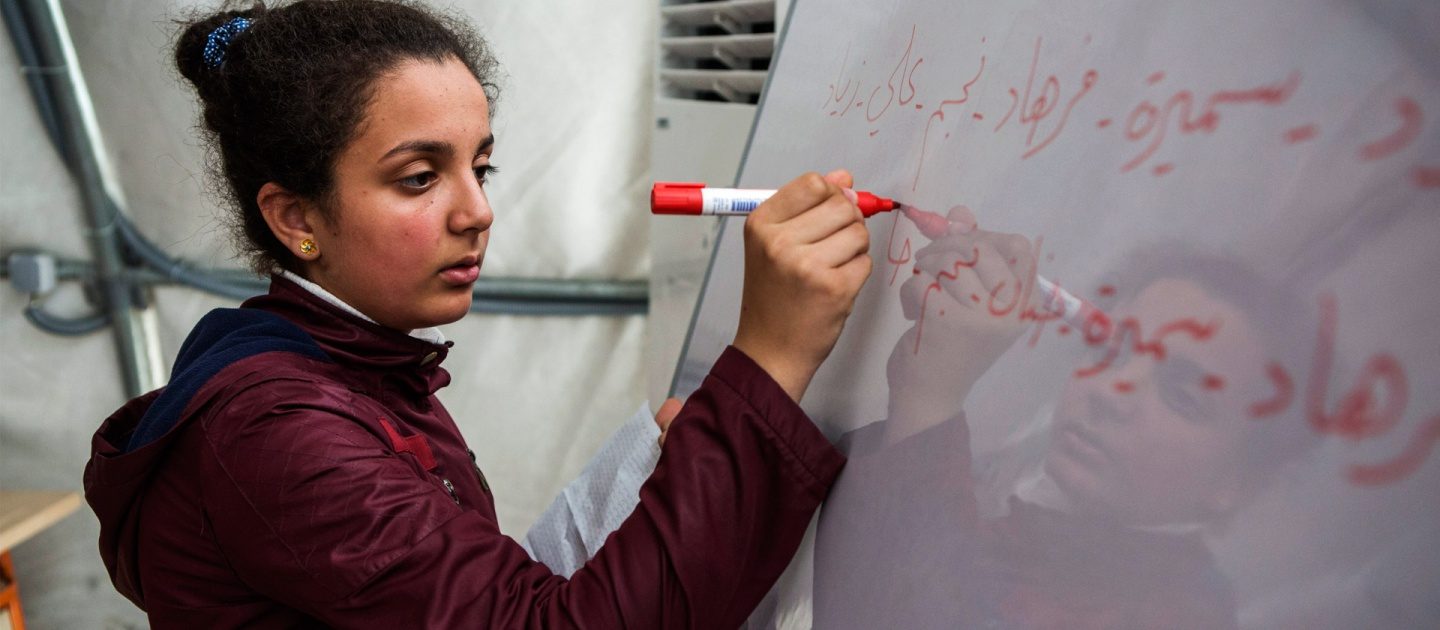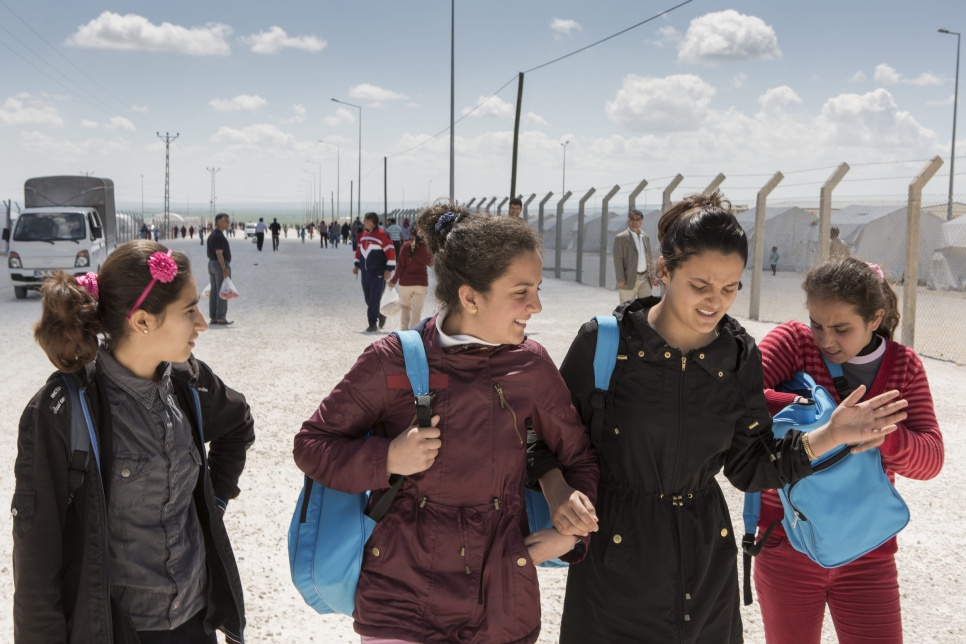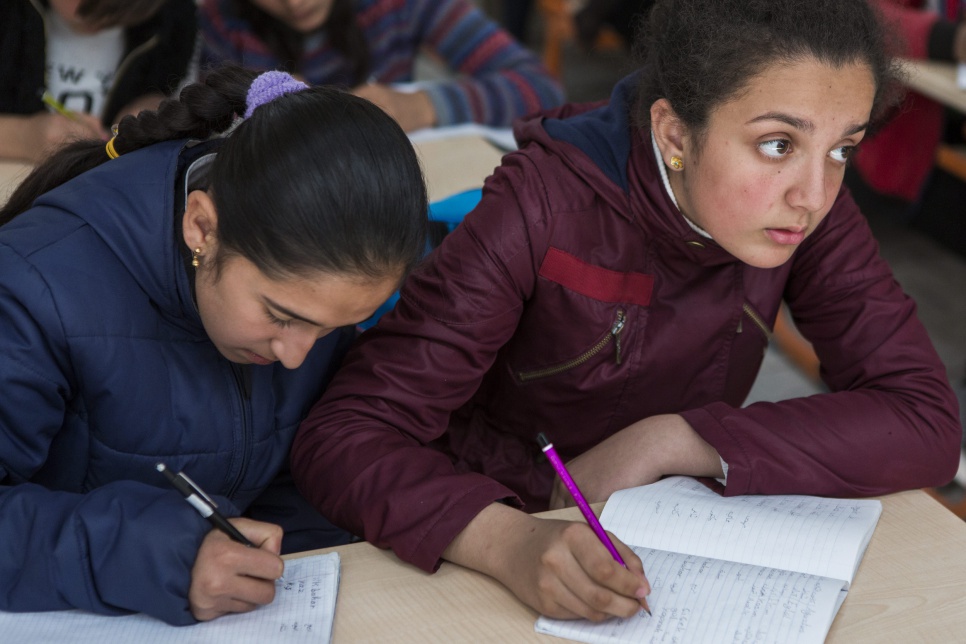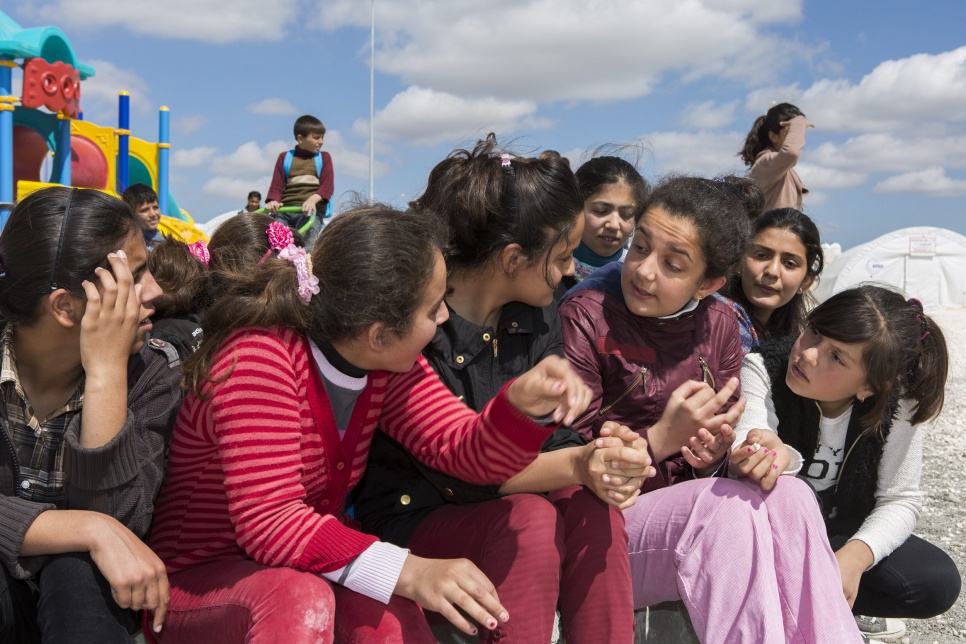During a break between classes, Ivra and her clutch of friends sit near the edge of a small playground in southern Turkey. Teenagers, they’re mostly dressed in skinny jeans and trainers; some wear decorative scarves and nail polish. As they gossip, crack jokes and chat about school assignments, swarms of younger children run, push and shout all around them.
“They’re all so naughty,” Ivra, 13, says in effortless English, shaking her head and cracking a half-smile at the kids letting off steam in the middle of the school day. “At my old school there used to be rules,” she adds, sounding more like a nostalgic adult than a spirited young teenager.
Ivra, a girl whose childhood dreams have been cut short by war, is one of 4 million Syrians now registered as refugees in Turkey, Lebanon, Jordan, Iraq and Egypt. Another 278,000 are seeking international protection in Europe. With no end in sight to Syria’s war, the number of refugees will certainly continue to grow.
A Childhood Cut Short by Syria’s War: Ivra, 13, is one of some 25,000 people living in Suruç Camp in Turkey.
Turkey has taken in the greatest number of Syrian refugees – over 1.8 million – including Ivra’s family, who are among some 25,000 people now living in Suruç camp. Most refugees in Suruç fled the siege of Kobane, Syria, last fall. Visible from the main road, the camp’s white tents gleam in the sun, surrounded by hilly farmland.
“Before the school opened I had so much less hope.”
About a dozen long, white tents face the school’s courtyard, where a small playground provides the only splash of colour in a rocky, moonlike landscape. Here, more than 5,000 children attend classes in two shifts, and it’s in this space that Ivra says she feels most at home.
“Yeah, for sure, before the school opened I had so much less hope,” she says as her friends listen intently. Ivra learned her English at home in Kobane from watching American and British movies. There, all of her friends also spoke English and together they would listen to pop music: “Adele, One Direction, you know, OneRepublic.”
Now she hardly sees those friends. Like nearly everyone from Kobane, they’ve scattered. Many found safety in Turkey, living with relatives or in rented apartments in urban areas or in camps like Suruç. Others fled further, to Europe.
In Kobane, Ivra and her family were solidly middle-class; they lived in the city centre in a modern, three-bedroom house. Her parents, an architect and an elementary school teacher, explain that they could have moved into an apartment in one of the small towns that dot Turkey’s southern border, as most of their friends did. But Ivra and her siblings don’t speak Turkish, so the local schools were not an option.
“I don’t want generations to stay untaught,” says Ziad, Ivra’s father. He and his wife agreed that it was more important for their children to continue their education to live in comfort, so they moved into Suruç camp. Here, their home is a tent measuring roughly nine square metres. Sleeping mattresses are stacked in a corner during the day, and the kitchen is a hot plate, a small sink and a mini-fridge. Shared bathrooms and showers are in a trailer nearby.
Ivra is a bright student. Sitting upfront in class, she raises her hand at every question and is the first one done with each assignment. But her school day is only four hours long, to make room for a second shift, and filling the rest of the day is difficult. “Always I’m bored,” she admits.
Ivra and her family stand for a portrait outside the tent where they are living in Turkey’s Suruç refugee camp. © UNHCR/Ivor Prickett
Back in Kobane, Ivra played basketball with friends after school and took music lessons on the tanboor, a traditional string instrument with a long neck. Her favourite place was her bedroom, where she listened to pop music and sang along in front of the mirror, pretending her hairbrush was a microphone. “I actually wanted to play guitar,” Ivra says, but her father wanted her to learn a more traditional instrument.
Now, in Suruç camp, Ivra says she spends most of her free time watching movies. The films that once helped her learn a new language are now just filling time. Other students play volleyball and basketball after school, but Ivra has lost interest in playing sports or practicing music. “That was a long time ago,” she says, thinking back to life in Kobane.
Her only regular activity besides attending school is acting in a play with a small theatre group. Hannan, 29, the play’s writer, director and lead actor, says the production “describes everything that happened to the people of Kobane – the suffering, the hardship.”
“I don’t want generations to stay untaught.”
At a rehearsal held in one of the school’s kindergarten classrooms, the cast members slowly pour in, removing their shoes at the door before taking a seat on the carpeted floor. Hannan points to one woman as she enters. “She plays my mother. She cries a lot.”
Ivra plays a nameless “high school girl.” In one scene, she bids an emotional goodbye to Hannan’s character, Ozad, who has decided he must leave Kobane in search of work in Lebanon in order to earn enough money to marry his fiancée. The play ends with Ozad being beaten to death by militants and the rest of the cast singing about the loss.
Ivra sings a few bars of the song during rehearsal. “I can translate it into English,” she says, “but it’s supposed to make the audience feel a lot of sadness.”
When Ivra first arrived in Turkey as a refugee, she felt sad about leaving her home, but also excited to see a new country. For the first few weeks, life as a refugee felt like an adventure. Eventually, disenchantment set in. “I didn’t think it would be like this,” she says.
Since then, her hopes for the future have slowly faded as she’s adjusted to her new life.
“First, when I was a child, I thought I would be a fashion designer,” she says, smiling, “because I love fashion, you know, accessories and stuff.” But since fleeing her home, Ivra says she’s changed her mind and now wants to be a doctor.
“Fashion doesn’t belong in a place like this,” she says, referring to the refugee camp. “And as long as I’m a refugee, I don’t think all of my dreams will come true.”
“Fashion doesn’t belong in a place like this.”
“Maybe my friends in Europe,” she continues. “Maybe their dreams will come true. Maybe they’ll be able to be a singer or an actor or use their talents in some way.”
When she first fled, Ivra says, she had hopes of returning home and picking up where she left off. But as the weeks have turned into months, she now says she has little hope of returning to Kobane.
Still barely a teenager, Ivra reflects on how her outlook has changed in the time since her life was upended by war. “I was young then. I used to think anything was possible.”







